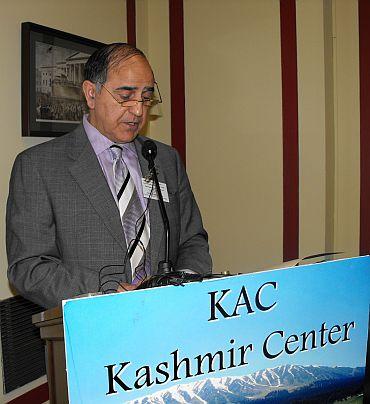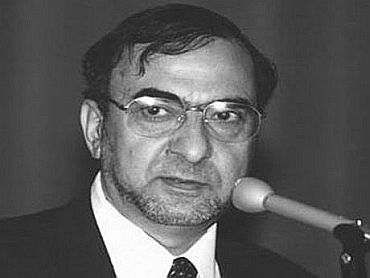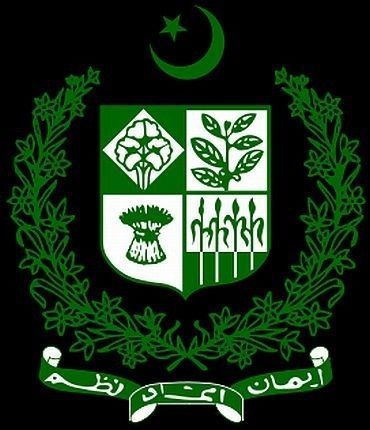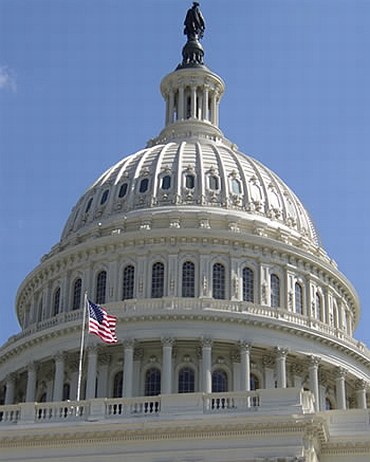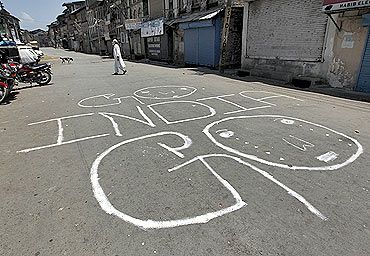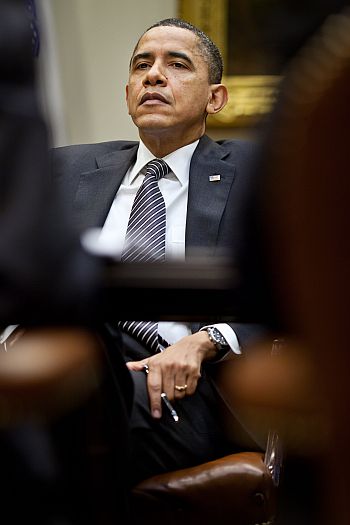 | « Back to article | Print this article |
How 'ISI spy' Fai pushed anti-India agenda in US
In the first such known case in United States's history, an American citizen -- Srinagar-born, Kashmiri separatist leader Dr Ghulam Nabi Fai -- has admitted that he acted as an operative of the Inter Services Intelligence.
Fai, 62, admitted to acting on the Pakistani spy agency's specific instructions and funneling thousands of dollars to try and influence US policy -- particularly through illegal lobbying in the US Congress -- towards Kashmir. He simultaneously urged US lawmakers, who were the beneficiaries of these contributions, to malign India for its alleged draconian policies in the Valley.
Fai was undisputedly one of the most influential Kashmiri Americans in the country. He was the founder and the executive director of the Kashmiri American Council, headquartered in Washington, DC, that espoused independence for Jammu and Kashmir.
Fai pleaded guilty Wednesday in the US District Court in Alexandria, Virginia to one count of conspiracy of receiving at least $3.5 million from the ISI between 1990 and 2011 and to one count of impeding the Internal Revenue Service to collect revenues of $200,000 to $400,000.
Under the terms of the plea agreement, Fai admitted that he would submit his strategy plans and budgets to his ISI supervisors, specifically to a point man named Javeed Aziz Khan, who also was known as 'Brigadier Abdullah'. Khan would then review these plans, revealed Fai, and send back suggested topics to be used at the Capitol Hill conferences the KAC would host to secure Congressional support to influence administration policy toward independence for Kashmir.
Following Fai's arrest on July 19, after which he was put under house arrest in his Fairfax, VA home in the suburbs of DC, his defence team initially claimed that he was not an agent of the ISI and all the lobbying he did as the head of the KAC was his own. They claimed that the funds received by the KAC were from donors who were Kashmiri Americans and supporters of the separatist cause.
Reportage: Aziz Haniffa in Washington, DC
Fai will get off with a lighter sentence
But, facing an iron-clad case, which the prosecutors presented with ample evidence of funds received for his illegal lobbying from the ISI and the unraveling of the network of straw donors through which this money was funneled, his defence team saw the writing on the wall and agreed to a guilty plea agreement. This could necessarily lead to a lighter sentence on March 9, where the judge is expected to also take his ill-health into consideration. Two years ago, Fai had suffered a serious stroke.
Law enforcement sources told rediff.com that if Fai had not entered into a plea agreement and the case had gone to trial, the prosecution with its iron-clad evidence and several affidavits by witnesses could have asked for a maximum sentence of five years in prison if convicted.
The sources said it is likely that Fai, now free on bond, would now get off with a considerably lighter sentence. He may be put under a kind of house arrest in a half-way house with a couple of years probation time.
When Fai was arrested in July, Zaheer Ahmad, 63, a US citizen and resident of Pakistan, was charged along with him.
The Federal Bureau of Investigation, which arrested Fai when he returned from one of his many overseas trips, said in an affidavit that he received approximately $500,000 to $700,000 per year from the government of Pakistan.
As part of the plea agreement, where he pleaded guilty, he admitted to only a generic count of conspiracy and impeding the revenue collection of the IRS, but there was no mention of the violation of Foreign Agents Registration Act.
Fai's attorney Nina Ginsberg argued that all the lobbying Fai did was of his own volition and not under the specific instructions of the ISI.
She also issued a statement by Fai after his guilty plea sating that "the Kashmiri American Council and I have always tried to represent the sentiments of the people of Kashmir, irrespective of the religious background and cultural affiliations."
The KAC also issued a statement welcoming the court's decision to not prosecute Fai for the violation of FARA and maintaining that it was independent of the ISI. It also pointed out that the KAC had issued op-ed articles that had strongly criticised Pakistan's policies on Kashmir as much as it did India's.
'Mr Fai secretly took millions of dollars'
But US Attorney for the Eastern District of Virginia Neil MacBride, dismissing these arguments, said that it was a no-brainer that Fai was "a paid operative" of the ISI and that his links to the ISI were extensive.
"For the last 20 years," he asserted, "Mr Fai secretly took millions of dollars from Pakistani intelligence and lied about it to the US government."
McBride said, "As a paid operative of ISI, he did the bidding of his handlers in Pakistan while he met with US elected officials, funded high-profile conferences, and promoted the Kahsmiri cause to decision-makers in Washington."
Assistant Attorney General for National Security Lisa Monaco, echoing McBride's sentiments, said, "Syed Fai admitted his role in a decades-long scheme to conceal the fact that the government of Pakistan was secretly funding his efforts to influence US policy on Kashmir."
Earlier, McBride had said that Fai's decades-long scheme had only "one purpose -- to hide Pakistan's involvement behind his efforts to influence the US government's position on Kashmir."
The KAC, established in 1990, regularly held press briefings at the National Press Club and hosted conferences, including a major annual conference on Capitol Hill, which was attended by influential US lawmakers, including members of the House Foreign Affairs Committee like Congressman Dan Burton, Indiana Republican and a longtime bete noire of New Delhi, Congressman Joe Pitts, Pennsylvania Republican and Jim Moran, Virginia Democrat who would bemoan the situation in the Valley and the human rights abuses perpetrated by Indian security forces and paramilitary groups.
These conferences would also always be attended by the Pakistan ambassador to the US, and senior Pakistan government officials as well as legislators. Till he was fired a month ago for his role in the Memogate issue, Pakistani ambassador Husain Haqqani was a conspicuous presence at Fai's Capitol Hill conferences, as were earlier ambassadors like Maleeha Lodhi.
These conferences have also been able to draw some leading South Asian experts and former diplomats like Howard Schaffer, a 36-year veteran of the US Foreign Service and the author of the recently published seminal book on American diplomacy and intervention in Kashmir, The Limits of Influence: America's Role in Kashmir, published by the Brookings Institution.
Fai has also, over the years, hosted some Indian journalists and Indian American academics.
Indian embassy officials, including the Indian Ambassador to the US, have also over the years been religiously invited by Fai to attend and speak at these annual conferences. But as far as this correspondent can remember, not a single embassy official has attended these conferences, let alone speak at these two-day parleys.
ISI has been directing Fai's activities
These Capitol Hill conferences have almost always been attended by the prime minister and former prime ministers and senior officials of Pakistani Occupied Kashmir.
Whenever Kashmiri leaders like Mirwaiz Farooq, former Jammu and Kashmir Liberation Front leader Yasin Malik or others from the Hurriyat Conference visit Washington, they usually stay with Fai at his Fairfax home. He arranges meetings between them and US lawmakers, administration officials and organises seminars and forums for them at Washington, DC think-tanks.
Fai also constantly traveled around the world, delivering speeches, and regularly visited Vienna and Geneva to appear before the UN Human Rights Council to make a case on behalf of the people of Jammu and Kashmir and the constant violation of their human and civil rights by the government and the troops in the Valley. Over the years, he has also been a regular speaker at universities and colleges across the US.
The government's affidavit submitted with Fai's arrest in July alleged that although the KAC held itself out to be a Kashmiri organisation run by Kashmiris and financed by Americans, the KAC is one of three "Kashmir Centres" that are actually run by elements of the Pakistani government, including the ISI. The two other Kashmir Centres are in London and Brussels.
According to the affidavit, a confidential witness told investigators that he participated in a scheme to obscure the origin of money transferred by Pakistan's ISI to Fai for his work as a lobbyist for the KAC in furtherance of Pakistani government interests. The witness explained that the money was transferred to Fai through Ahmad, an American living in Pakistan.
A second confidential witness told investigators that the ISI created the KAC to propagandise on behalf of the government of Pakistan with the goal of uniting Kashmir. This witness said ISI's sponsorship and control of KAC was a secret and that ISI had been directing Fai's activities for the past 25 years.
When questioned by the FBI about these relationships in March 2007, Fai allegedly stated that he had never met anyone who identified himself as being affiliated with the ISI.
In March 2010, the Justice Department sent Fai a letter notifying him of his possible obligation to register as a foreign agent with the Justice Department. In his written response to the Justice Department, Fai asserted that neither he nor KAC had ever engaged in any activities for or provided any services to Pakistan or any foreign entity. In a March 2011 interview with the FBI, Fai again denied having any relationship with anyone in the Pakistani government.
'The council's lobbying has had minimal success'
The affidavit alleges that Fai has acted at the direction of and with the financial support of the Pakistani government for more than 20 years. The affidavit alleges that four Pakistani government handlers have directed Fai's US activities and he has been in touch with his handlers more than 4,000 times since June 2008. Fai's handlers have also allegedly communicated with Ahmad regularly.
For example, the affidavit alleges that Fai repeatedly submitted annual KAC strategy reports and budgetary requirements to his Pakistani government handlers for approval.
One document entitled "Plan of Action of KAC / Kashmir Centre for Fiscal Year 2009" laid out Fai's intended strategy to secure US Congressional support in order to encourage the executive branch to support self-determination in Kashmir; his strategy to build new alliances in the State Department, the National Security Council, the Congress and the Pentagon, and to expand KAC's media efforts.
According to the affidavit, Fai also set forth KAC's projected budgetary requirements from the Pakistani government for 2009, including $100,000 for contributions to members of Congress. There is no evidence that any elected official who received financial contributions from Fai or the KAC was aware that the money originated from any part of the Pakistani government.
The affidavit further said that Fai and the KAC have received at least $4 million from the Pakistani government since the mid-1990s through Ahmad and his funding network. The money is allegedly routed to Fai through Ahmad and a network of other individuals connected to Ahmad. Ahmad allegedly arranges for his contacts in the United States to provide money to Fai in return for repayment of those amounts in Pakistan.
When Fai was arrested, Schaffer told rediff.com, "If the Inter-Services Directorate or some other organ of the Pakistan government has been footing the Kashmir American Council's bills, as seems so obvious, it is hard to conclude that they have been getting their money's worth."
Schaffer, who was the lead panelist on the session on India-Pakistan Relations: Breaking the Deadlock over Kashmir at the last International Kashmir Peace Conference in August 2010 on Capitol Hill, said, "For all its efforts, the council's lobbying has had minimal success in persuading the Clinton, George W Bush, and Obama administrations to change their basically hands-off diplomacy on the Kashmir dispute."
However, Schaffer said, "It is regrettable that the charges against Fai have been raised at a point when US-Pakistan relations face a host of problems far more consequential than alleged wrongdoings by Pakistan's lobbyists in Washington."
'US should help resolve the Kashmir crisis'
He recalled that at these Capitol Hill conferences, "Members of Congress play bit-parts. Some of them, such as Representative Dan Burton, Indiana Republican, are familiar with the Kashmir issue, or at least Pakistan's interpretation of it, and apparently feel strongly about it. But many others appear to have come to the sessions with scant awareness of the nature of the dispute. They customarily appear briefly, read prepared scripts, and hastily depart."
At the annual Capitol Hill Conference on August 10, Pitts called on President Barack Obama to keep his campaign pledge to help resolve this dispute between India and Pakistan.
Pitts recalled that "during his campaign, President Obama suggested that the US should help resolve the Kashmir crisis. I heard one suggestion that they have a special envoy for Kashmir. And we need to develop that kind of expertise in our own government -- in our own State Department. I wholeheartedly agree and hope this administration will engage productively on this critical issue."
At the same conference, Pitts recalled his several visits to Pakistan-Occupied-Kashmir and Pakistan and said he had founded the Kashmir Forum "and we support the idea of self-determination for the people in the area."
Both Burton and Pitts later claimed that they had absolutely no idea that the funds they received from Fai were sent by the ISI.
Subsequently, they said they had donated these funds to charities, including the Boy Scouts of America.
Burton told the New York Times that he was "deeply shocked" because he had known Fai for 20 years and "in that time I had no inkling of his involvement with any foreign intelligence operation and had presumed our correspondence was legitimate."
